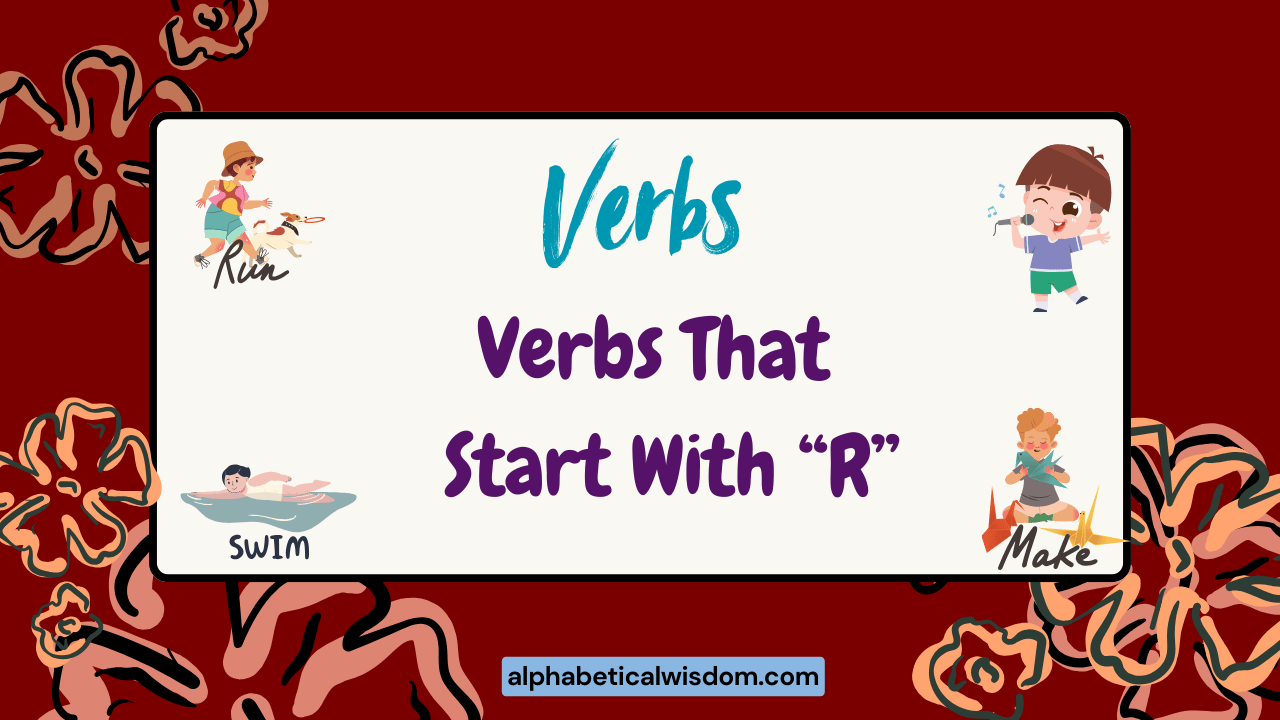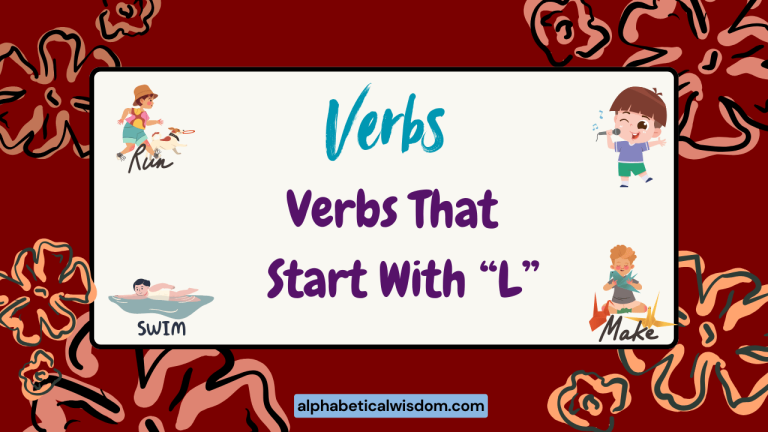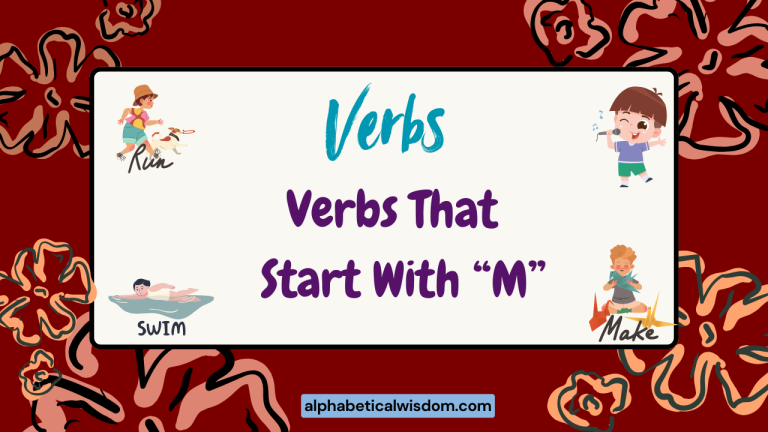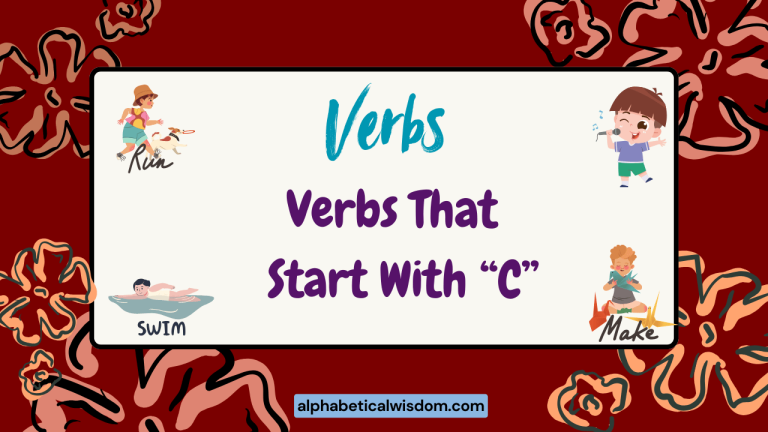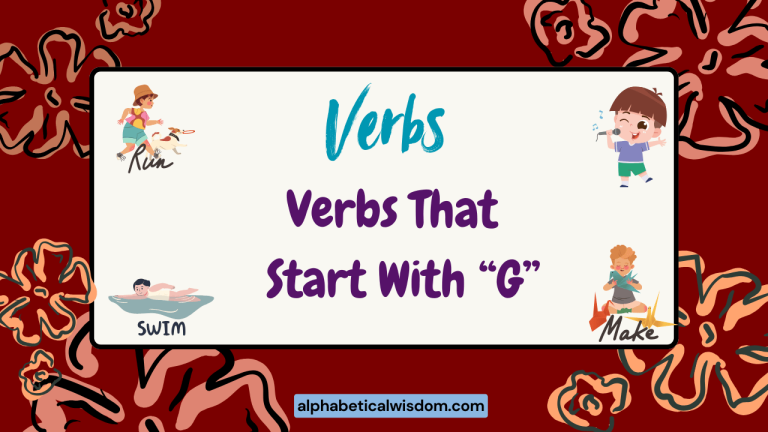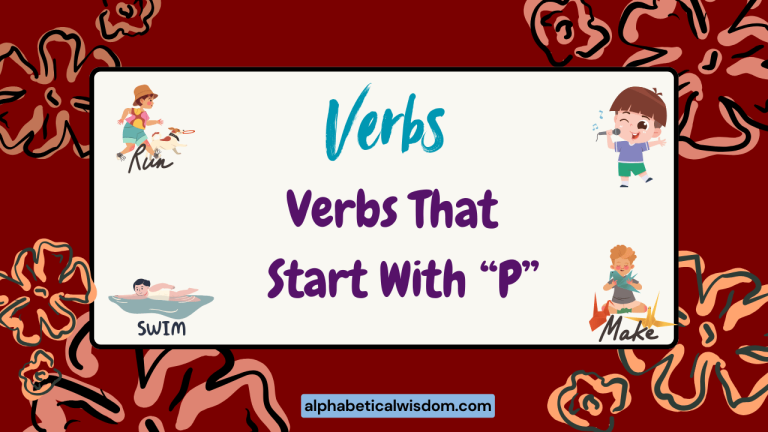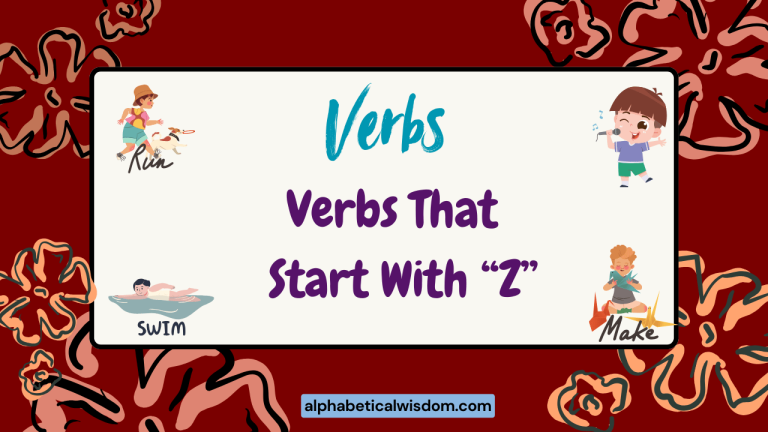Verbs Starting with R: A Comprehensive English Grammar Guide
Mastering verbs is crucial for constructing grammatically correct and meaningful sentences in English. Verbs that start with the letter “R” are particularly diverse, encompassing actions, states, and occurrences across various contexts.
This article provides a comprehensive guide to understanding and using these verbs effectively. Whether you’re an ESL learner, a student refining your writing skills, or simply someone looking to enhance your command of the English language, this resource will equip you with the knowledge and practice you need to confidently incorporate “R” verbs into your vocabulary.
From basic actions like “run” and “read” to more complex concepts like “reconcile” and “reiterate,” this guide explores the nuances of “R” verbs. We’ll delve into their definitions, structural patterns, usage rules, and common mistakes to avoid.
Through numerous examples, practice exercises, and advanced topics, you’ll gain a solid grasp of how to use these verbs accurately and effectively, enriching your communication and writing skills.
Table of Contents
- Definition of Verbs Starting with R
- Structural Breakdown of R Verbs
- Types and Categories of R Verbs
- Examples of Verbs Starting with R
- Usage Rules for R Verbs
- Common Mistakes with R Verbs
- Practice Exercises
- Advanced Topics
- FAQ: Frequently Asked Questions
- Conclusion
Definition of Verbs Starting with R
A verb is a word that describes an action, occurrence, or state of being. Verbs that start with “R” are a subset of these words, sharing the common initial letter but varying widely in meaning and usage.
They function like any other verb, serving as the predicate of a sentence or clause and indicating what the subject does, is, or experiences. These verbs can express physical actions, mental processes, relationships, or states of existence.
The context in which they are used determines their specific meaning and grammatical function.
Verbs starting with “R” can be classified based on various criteria, including their function (action, linking, auxiliary), transitivity (transitive, intransitive), and regularity (regular, irregular). Understanding these classifications is essential for using “R” verbs correctly and effectively.
For example, a verb like “run” is an action verb and can be either transitive or intransitive depending on the sentence structure, while “remain” is typically a linking verb, connecting the subject to a descriptive word or phrase. The ability to identify and categorize these verbs enhances one’s overall grammatical proficiency.
Structural Breakdown of R Verbs
The structural breakdown of verbs starting with “R” involves understanding their basic forms and how they change to indicate tense, mood, and voice. The base form, also known as the infinitive, is the simplest form of the verb (e.g., to read). From this base form, various other forms are derived, including the past tense (e.g., read), past participle (e.g., read), present participle (e.g., reading), and third-person singular present tense (e.g., reads). The specific formation of these tenses depends on whether the verb is regular or irregular.
Regular verbs follow a predictable pattern, forming the past tense and past participle by adding “-ed” to the base form (e.g., reach, reached, reached). Irregular verbs, on the other hand, have unpredictable forms that must be memorized (e.g., run, ran, run). Additionally, verbs can be modified by auxiliary verbs (e.g., is reading, has reached) to express different tenses, aspects, and moods. Understanding these structural elements is essential for constructing grammatically correct and nuanced sentences using verbs that start with the letter “R”.
Types and Categories of R Verbs
Verbs starting with “R,” like all verbs, can be categorized in several ways based on their function and behavior within a sentence. Understanding these categories helps in using the verbs correctly and effectively.
Action Verbs
Action verbs describe physical or mental actions. They indicate what the subject of the sentence is doing.
These verbs are often dynamic and create a vivid image in the reader’s mind.
Examples of action verbs starting with “R” include: run, read, reach, ride, repair, remove, return, relax, remember, realize, record, reduce, reflect, regret, reject, relate, release, rely, remain, render, repeat, replace, report, request, require, resemble, resist, resolve, respond, rest, restore, and retrieve.
Linking Verbs
Linking verbs connect the subject of a sentence to a noun or adjective that describes or identifies the subject. They do not express an action but rather a state of being or a condition.
While fewer “R” verbs function primarily as linking verbs, “remain” is a common example. Others can function as linking verbs depending on the context, such as “rest” (in the sense of “remain”). For example: “He remained silent.”
Auxiliary Verbs
Auxiliary verbs, also known as helping verbs, are used with a main verb to form compound tenses, voices, and moods. They help to express nuances of time and possibility.
While no primary auxiliary verbs start with “R,” verbs like “require” can sometimes function in a way that resembles auxiliary usage, particularly in passive constructions. However, this is less common than with verbs like “be,” “have,” and “do.”
Transitive Verbs
Transitive verbs require a direct object to complete their meaning. The direct object receives the action of the verb.
Examples of transitive verbs starting with “R” include: read (a book), repair (the car), remove (the stain), record (a song), reduce (the price), reject (the offer), relate (a story), release (the prisoner), repeat (the word), replace (the old one), report (the incident), request (permission), require (assistance), resemble (his father), resist (temptation), resolve (the issue), restore (the painting), and retrieve (the data).
Intransitive Verbs
Intransitive verbs do not require a direct object. The action of the verb is complete in itself.
Examples of intransitive verbs starting with “R” include: run (quickly), rest (peacefully), respond (immediately), react (strongly), relax (completely), remain (calm), retire (early), and return (home).
Regular Verbs
Regular verbs form their past tense and past participle by adding “-ed” or “-d” to the base form.
Examples of regular verbs starting with “R” include: reach, realize, record, reduce, reflect, regret, relate, release, rely, remain, render, repeat, replace, report, request, require, resemble, resist, resolve, respond, rest, restore, and retrieve.
Irregular Verbs
Irregular verbs do not follow the standard “-ed” rule for forming their past tense and past participle. Their forms must be memorized.
Examples of irregular verbs starting with “R” include: run (ran, run), read (read, read), ride (rode, ridden), ring (rang, rung), rise (rose, risen), rend (rent, rent), rewrite (rewrote, rewritten).
Examples of Verbs Starting with R
This section provides extensive examples of verbs starting with “R” used in various contexts. These examples are organized by category to illustrate their different functions and meanings.
The following table presents examples of Action Verbs that start with “R”:
| Verb | Example Sentence |
|---|---|
| Run | She runs five miles every morning. |
| Read | He reads novels in his free time. |
| Reach | I can reach the top shelf easily. |
| Ride | They ride their bikes to school. |
| Repair | He repairs old cars as a hobby. |
| Remove | Please remove your shoes before entering. |
| Return | I will return the book to the library tomorrow. |
| Relax | We relax by the pool on weekends. |
| Remember | I always remember her birthday. |
| Realize | She didn’t realize the danger. |
| Record | They record their music in a professional studio. |
| Reduce | We need to reduce our carbon footprint. |
| Reflect | The lake reflects the mountains beautifully. |
| Regret | I regret not studying harder. |
| Reject | The company rejected his application. |
| Relate | She can relate to their experiences. |
| Release | The company will release the new product next month. |
| Rely | You can rely on me for support. |
| Remain | They remain hopeful despite the challenges. |
| Render | The artist rendered the landscape in vivid colors. |
| Repeat | Could you please repeat the question? |
| Replace | We need to replace the broken window. |
| Report | The journalist reported on the event. |
| Request | I would like to request a meeting. |
| Require | This job requires a lot of patience. |
| Resemble | He resembles his older brother. |
| Resist | It’s hard to resist the temptation. |
| Resolve | We need to resolve this issue quickly. |
| Respond | Please respond to my email as soon as possible. |
| Rest | I need to rest after a long day. |
| Restore | They are working to restore the old building. |
| Retrieve | I need to retrieve the file from the server. |
The following table presents examples of Linking Verbs that start with “R”:
| Verb | Example Sentence |
|---|---|
| Remain | The door remained open. |
| Rest (as in remain) | The decision rests with the manager. |
The following table showcases examples of Transitive Verbs beginning with “R”:
| Verb | Example Sentence |
|---|---|
| Read | She reads the newspaper every morning. |
| Repair | He repaired the broken bicycle. |
| Remove | They removed the old furniture. |
| Record | The band recorded their new album. |
| Reduce | The store reduced prices for the sale. |
| Reject | The committee rejected the proposal. |
| Relate | She related the story of her travels. |
| Release | The company released a new software update. |
| Repeat | The teacher repeated the instructions. |
| Replace | We replaced the old tires with new ones. |
| Report | The witness reported the accident to the police. |
| Request | He requested a copy of the document. |
| Require | The course requires a lot of reading. |
| Resemble | The child resembles his mother. |
| Resist | She couldn’t resist the delicious dessert. |
| Resolve | They resolved the conflict peacefully. |
| Restore | The museum restored the ancient artifact. |
| Retrieve | He retrieved the lost keys. |
The table below provides some examples of Intransitive Verbs that begin with “R”:
| Verb | Example Sentence |
|---|---|
| Run | The athlete ran very fast. |
| Rest | We need to rest after the hike. |
| Respond | He responded quickly to the email. |
| React | She reacted strongly to the news. |
| Relax | I like to relax on the beach. |
| Remain | The situation remained uncertain. |
| Retire | He plans to retire next year. |
| Return | They will return tomorrow. |
| Rise | The sun rises in the east. |
The following table shows Regular and Irregular verbs, all starting with “R”:
| Verb (Base Form) | Type | Past Tense | Past Participle |
|---|---|---|---|
| Reach | Regular | Reached | Reached |
| Realize | Regular | Realized | Realized |
| Record | Regular | Recorded | Recorded |
| Reduce | Regular | Reduced | Reduced |
| Reflect | Regular | Reflected | Reflected |
| Regret | Regular | Regretted | Regretted |
| Relate | Regular | Related | Related |
| Release | Regular | Released | Released |
| Rely | Regular | Relied | Relied |
| Remain | Regular | Remained | Remained |
| Render | Regular | Rendered | Rendered |
| Repeat | Regular | Repeated | Repeated |
| Replace | Regular | Replaced | Replaced |
| Report | Regular | Reported | Reported |
| Request | Regular | Requested | Requested |
| Require | Regular | Required | Required |
| Resemble | Regular | Resembled | Resembled |
| Resist | Regular | Resisted | Resisted |
| Resolve | Regular | Resolved | Resolved |
| Respond | Regular | Responded | Responded |
| Rest | Regular | Rested | Rested |
| Restore | Regular | Restored | Restored |
| Retrieve | Regular | Retrieved | Retrieved |
| Run | Irregular | Ran | Run |
| Read | Irregular | Read | Read |
| Ride | Irregular | Rode | Ridden |
| Ring | Irregular | Rang | Rung |
| Rise | Irregular | Rose | Risen |
| Rend | Irregular | Rent | Rent |
| Rewrite | Irregular | Rewrote | Rewritten |
Usage Rules for R Verbs
Using verbs correctly involves adhering to specific grammatical rules. This section outlines the key rules for using verbs starting with “R,” including tense agreement, subject-verb agreement, voice, and mood.
Tense Agreement
Tense agreement ensures that the verbs in a sentence or paragraph are consistent in time. This means that if the main verb is in the past tense, subsequent verbs should also be in the past tense, unless there is a clear reason to indicate a different time frame.
Correct: She read the book and returned it to the library. (Both verbs are in the past tense.)
Incorrect: She read the book and returns it to the library. (The first verb is in the past tense, while the second is in the present tense.)
Subject-Verb Agreement
Subject-verb agreement requires that the verb agrees in number with its subject. If the subject is singular, the verb must be singular.
If the subject is plural, the verb must be plural.
Correct: He runs every morning. (Singular subject “He” agrees with the singular verb “runs.”)
Correct: They run every morning. (Plural subject “They” agrees with the plural verb “run.”)
Incorrect: He run every morning. (Singular subject “He” incorrectly uses the plural verb “run.”)
Active and Passive Voice
Verbs can be used in either the active or passive voice. In the active voice, the subject performs the action.
In the passive voice, the subject receives the action.
Active: She repaired the car. (The subject “she” performs the action of repairing.)
Passive: The car was repaired by her. (The subject “car” receives the action of being repaired.)
Indicative, Imperative, and Subjunctive Mood
The mood of a verb indicates the manner in which the action or state is expressed. The three main moods are indicative, imperative, and subjunctive.
- Indicative Mood: Expresses a fact or opinion. Example: He reads the newspaper.
- Imperative Mood: Expresses a command or request. Example: Read this carefully!
- Subjunctive Mood: Expresses a wish, possibility, or condition contrary to fact. Example: I wish I were richer. (While “were” is a form of “be,” the subjunctive is relevant to understanding verb moods in general.)
Common Mistakes with R Verbs
Even experienced English speakers sometimes make mistakes with verbs. Here are some common errors involving verbs starting with “R,” along with corrections.
| Incorrect | Correct | Explanation |
|---|---|---|
| She run to the store yesterday. | She ran to the store yesterday. | Incorrect past tense of “run.” |
| He readed the book. | He read the book. | “Read” is an irregular verb; the past tense is “read,” not “readed.” |
| They rely on she. | They rely on her. | Incorrect pronoun case. “Rely” is followed by an object pronoun. |
| The report were submitted. | The report was submitted. | Incorrect subject-verb agreement. “Report” is singular, so the verb should be “was.” |
| I remembered to called him. | I remembered to call him. | Incorrect use of the infinitive. It should be “to call,” not “to called.” |
| She resigned from she’s job. | She resigned from her job. | Incorrect possessive pronoun. It should be “her,” not “she’s.” |
| He repeated again the question. | He repeated the question. | “Repeat” already implies doing something again, so “again” is redundant. |
| They restored back the painting. | They restored the painting. | “Restore” implies returning something to its original condition, so “back” is redundant. |
Practice Exercises
Test your understanding of verbs starting with “R” with these practice exercises. Each exercise focuses on different aspects of verb usage, from tense agreement to subject-verb agreement.
Exercise 1: Fill in the blank with the correct form of the verb in parentheses.
| Question | Answer |
|---|---|
| 1. She _________ (run) every morning before work. | runs |
| 2. They _________ (read) the book last night. | read |
| 3. He _________ (repair) the car yesterday. | repaired |
| 4. We _________ (remove) the trash every week. | remove |
| 5. I _________ (return) the library book tomorrow. | will return |
| 6. They _________ (relax) by the pool on weekends. | relax |
| 7. She _________ (remember) to buy milk. | remembered |
| 8. He _________ (realize) his mistake. | realized |
| 9. They _________ (record) a new song. | recorded |
| 10. We _________ (reduce) our expenses this month. | reduced |
Exercise 2: Identify the tense of the verb in each sentence.
| Question | Answer |
|---|---|
| 1. She runs every morning. | Present Simple |
| 2. They read the book last night. | Past Simple |
| 3. He will repair the car tomorrow. | Future Simple |
| 4. We are removing the trash now. | Present Continuous |
| 5. I had returned the book before the deadline. | Past Perfect |
| 6. They have been relaxing by the pool all day. | Present Perfect Continuous |
| 7. She will have remembered by then. | Future Perfect |
| 8. He had realized his mistake earlier. | Past Perfect |
| 9. They are recording a new album this week. | Present Continuous |
| 10. We were reducing our expenses last year. | Past Continuous |
Exercise 3: Choose the correct verb form to agree with the subject.
| Question | Answer |
|---|---|
| 1. The dog _________ (runs/run) in the park. | runs |
| 2. The children _________ (read/reads) books every day. | read |
| 3. He _________ (repairs/repair) cars as a hobby. | repairs |
| 4. They _________ (remove/removes) the snow in the winter. | remove |
| 5. She _________ (returns/return) the calls promptly. | returns |
| 6. We _________ (relax/relaxes) on vacation. | relax |
| 7. He _________ (remember/remembers) all the details. | remembers |
| 8. They _________ (realize/realizes) the importance of education. | realize |
| 9. She _________ (record/records) her thoughts in a journal. | records |
| 10. We _________ (reduce/reduces) waste by recycling. | reduce |
Advanced Topics
For advanced learners, understanding the nuances of phrasal verbs, idiomatic expressions, and formal vs. informal usage can significantly enhance their command of English.
Phrasal Verbs with R
Phrasal verbs consist of a verb and a preposition or adverb, often with a meaning that is different from the individual words. Understanding phrasal verbs is crucial for advanced English proficiency.
Examples of phrasal verbs with “R” include: run into (meet unexpectedly), rule out (exclude), root for (support enthusiastically), round up (gather together), and rip off (to cheat someone).
Idiomatic Expressions with R Verbs
Idiomatic expressions are phrases whose meaning cannot be understood from the literal meanings of the individual words. They add color and depth to the language.
Examples of idiomatic expressions with “R” verbs include: “ring a bell” (sound familiar), “rub someone the wrong way” (annoy someone), “rock the boat” (cause trouble), and “rise and shine” (wake up and be energetic).
Formal vs. Informal Usage
The choice of words can vary depending on the context, with formal language used in professional or academic settings and informal language used in casual conversations.
For example, “require” is more formal than “need,” and “resemble” is more formal than “look like.” Being aware of these distinctions allows for more effective communication in different situations.
FAQ: Frequently Asked Questions
This section addresses common questions about verbs starting with “R” to clarify any remaining doubts.
- What is the difference between “raise” and “rise”?
“Raise” is a transitive verb that requires a direct object, meaning you “raise” something else (e.g., raise your hand). “Rise” is an intransitive verb that does not take a direct object, meaning something “rises” on its own (e.g., the sun rises).
- How do I know if a verb is regular or irregular?
Regular verbs follow the standard “-ed” rule for forming the past tense and past participle. If a verb does not follow this rule, it is irregular. Irregular verbs must be memorized.
- Can a verb be both transitive and intransitive?
Yes, many verbs can be both transitive and intransitive depending on the context. For example, “run” can be transitive (“He runs a business”) or intransitive (“He runs quickly”).
- What is the difference between a linking verb and an action verb?
An action verb describes an action, while a linking verb connects the subject to a noun or adjective that describes or identifies the subject. Linking verbs do not express an action.
- How do I use verbs in the passive voice?
To use a verb in the passive voice, use a form of the auxiliary verb “be” (is, are, was, were, been, being) followed by the past participle of the main verb. For example, “The book was read by her.”
- What are auxiliary verbs and how are they used?
Auxiliary verbs, also known as helping verbs, are used with a main verb to form compound tenses, voices, and moods. Common auxiliary verbs include “be,” “have,” and “do.” While no primary auxiliary verbs start with “R”, understanding their function is vital for correct verb usage.
- How can I improve my verb usage in writing?
To improve your verb usage, practice writing regularly and pay attention to the verbs you use. Read widely and notice how different authors use verbs effectively. Use grammar resources and seek feedback on your writing.
- What is the subjunctive mood, and when should I use it?
The subjunctive mood is used to express wishes, possibilities, or conditions contrary to fact. It is often used in “if” clauses and after verbs like “suggest,” “recommend,” and “request.” For example, “I suggest that he *be* on time.”
- Are there specific rules for using “remember” vs. “remind”?
Yes, there are distinct uses. “Remember” means to bring back to mind or not forget something yourself (e.g., “I remember her birthday”). “Remind” means to cause someone else to remember something (e.g., “Please remind me to buy milk”).
- How do I avoid redundant words when using verbs like “repeat” or “restore”?
Verbs like “repeat” and “restore” already imply doing something again or returning something to its original condition. Avoid using words like “again” or “back” with these verbs, as they are redundant. For example, say “Repeat the question,” not “Repeat again the question,” and “Restore the painting,” not “Restore back the painting.”
Conclusion
Mastering verbs, particularly those starting with the letter “R,” is essential for effective communication in English. This comprehensive guide has covered the definitions, structural breakdown, types, and usage rules for “R” verbs.
By understanding these concepts and practicing regularly, you can enhance your command of the English language and express yourself with greater accuracy and confidence. Remember to pay attention to tense agreement, subject-verb agreement, voice, and mood, and be mindful of common mistakes.
With consistent effort and practice, you can unlock the full potential of “R” verbs and enrich your writing and speaking skills.
